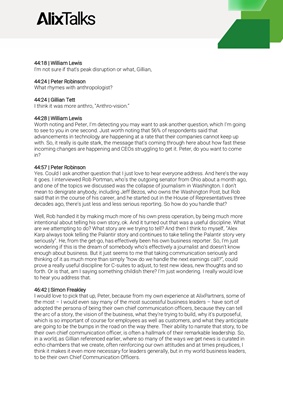
threatens to pull out if need be. So, it is something that we're following really closely. I
probably get a question about that every day. Is it likely they're going to look at secondary
sanctions?
47:57 | William Lewis
Which is very unsettling for people, isn't it, Wendy, because it's a great uncertainty.
Guy, if you were advising a business that in some way in the past had involvement with or has
ongoing interest, either direct or indirect, what sort of advice would you give them? Should
they make a proactive offer to the government? Should they issue a statement? Should they
make a charitable..? What's the best approach for business to take if it is ensnared in some
shape or form in the Russian economy?
48:33 | Guy Harrison
I'm neither a lawyer or a PR advisor, just a humble, reg tech provider. But, I think, and every
situation will be different, the thing that I would be doing in any business situation at the
moment is understanding who I do business with, either as a customer or supplier, and who
those companies do business with, so that I have an absolute, detailed understanding of my
third parties and their third parties. What business I've done with them, and where I've done it
as well. And only once I've got that viewpoint, that I've demanded that viewpoint and I've got a
good answer, would I then be in a position to decide whether a proactive disclosure or some
sort of public statement or so on would be required. But I think you need the information, you
need the facts at your fingertips, before you can even start to make some of these sorts of
decisions.
49:32 | William Lewis
Yeah, ok. So, know what you can know before you make any changes.
49:38 | Tom Scampion
If I might add, just on that point Will, I would also say: Be really clear about what your business
position, your appetite is for this. I remember working for a bank where I was the Global Head
of Sanctions, and the bank had got a policy which said that we will apply the OFAC restrictions
independent of a US Nexus. "I don't care if it's a transaction which has no dollar involved, no
US persons, and of course is physically remote from the US. I'm going to apply it." Why?
Because the risk appetite of the bank was to say, I want to focus on looking after our
reputation and therefore I'm choosing to do it. And that's a decision, that's a decision which is,
of course, fundamentally a policy call about the risk appetite of the business.
50:28 | William Lewis
And Tom, while we've got the mic, what, gaze into your crystal ball for us. How is this likely to
play out for individuals, businesses? What's your view, please?
50:40 | Tom Scampion
Look, I think, and for fear of covering ground that's already been covered, I'd say I think we
know where we're going to go with some of the energy, the oil and gas particularly, and that
will increase.
I wanted to pick up on the public relations aspect of it, and I too am not a public relations
expert, but let me give you a perspective on it. I think that the reputational risk is what is going